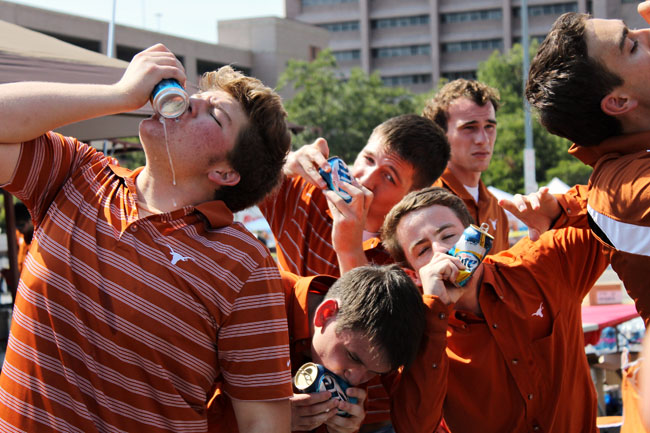Statistically speaking, two out of every five college students have gone binge drinking at least once in the last two weeks. This figure, which comes from a 2011 U.S. News and World Report story, may be even higher at UT. And this year, once again, UT made the top 20 in the Princeton Review’s list of biggest party schools. Regardless of the numbers, if you’re among the proportion of students raising a few glasses too many this weekend, you probably won’t be thinking of the impact that moment may have on your future alcohol habits. But maybe you should.
While many alumni claim to have given up their more irresponsible undergraduate pastimes after entering the workforce, some of the basic attitudes about alcohol never really go away. The question is whether the views we hold about alcohol in our life past college stem from our culture as a whole or from the culture we create around alcohol while in college.
The Atlantic Magazine recently featured an article titled “Alcohol as Escape from Perfectionism,” by Ann Dowsett Johnston, a Canadian journalist and the author of “Drink: The Intimate Relationship Between Women and Alcohol.” In her article, Johnston discusses the growing phenomenon of alcohol dependence among working mothers as a seemingly innocent way to smooth the transition from the hectic workday to the busy evening at home. But what exactly does this have to do with UT students?
The most notable statistic Johnston cites in her article is from a recent poll done by Netmums, the biggest parenting website in the UK. The social networking site, which has more 1.6 million members, found that 81 percent of people who drank above the UK government’s safe drinking guidelines said they did so “to wind down from a stressful day.” This statement may be an accurate characterization of our attitudes toward alcohol in the States as well. Binge drinking may stop after graduation, but the motivation behind our drinking habits seems to remain the same: We crave contrast between work and play.
Recent government alumnus Mathew Smith said he has observed this in the working culture in Washington, D.C. Smith graduated in the spring and now works for the federal government. He said that people prone to drinking in college maintain those habits to some degree.
Alcohol almost seems omnipresent in the professional atmosphere, both as a way to socialize and as a coping mechanism. Instead of binge drinking on the weekends, however, he said it is not unusual to know someone whose nightly routine involves cracking open a beer after work.
Julia Chuang, a management information systems major who graduated from UT in May, said people seem to drink a lot less in one sitting than they did in college but in a more casual manner that is perhaps just as widespread. Chuang, who now does data analytics for a large public accounting firm, noted that consumption habits also depend on the company drinking culture.
“People have drinks with their meals, and as an observation, upper management — especially females — like to drink a lot of wine,” Chuang said. “Happy hour is still a social thing, but in terms of drinking after work, it’s more of a stress reliever.”
As Johnston stated in her Atlantic article, “A glass or two seem[s] innocent enough.” However, with the increase in alcohol dependence among working moms and a 25-year high in U.S. drinking rates, according to a Gallup poll conducted in 2010, perhaps we should consider leaving the attitudes we develop toward alcohol during college behind after graduation.
Almeda is a marketing senior from Seattle. Follow Almeda on Twitter @Amanda_Almeda.





















